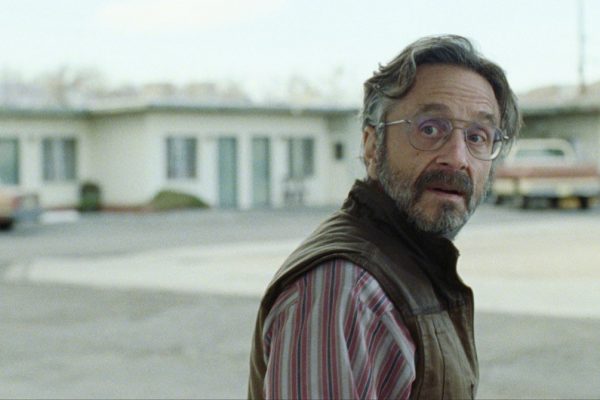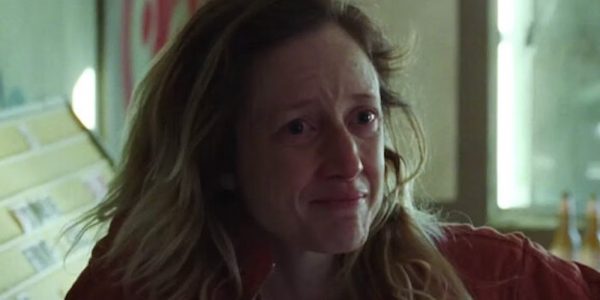‘To Leslie’ applauds recovery and redemption

“To Leslie” (2022). Cast: Andrea Riseborough, Allison Janney, Stephen Root, Owen Teague, Marc Maron, Andre Royo, James Landry Hébert, Catfish Jean, Matt Laurian, Mac Brandt, Tom Virtue, Lauren Letherer, Kourtney Amanda, Arabella Grant, Sewell Whitney, Drew Youngblood. Director: Michael Morris. Screenplay: Ryan Binaco. Web site. Trailer.
Years later, Leslie is penniless and without a home. She’s lost everything, including not only her winnings, but also her possessions, friends and family, as well as whatever reliability and credibility she may have had. Her now-older son (Owen Teague) left town some time ago to go out and make it on his own. And, with no hopeful prospects of her own in sight, Leslie is at her wit’s end. Of course, that can happen when one crawls into a bottle and stays there until all of one’s funds are used up, which, unfortunately, is precisely what happened to her.
Now older (but not necessarily wiser), Leslie looks for a fresh start. She asks James if she can come stay with him while she gets her act together, a plan that, at his insistence, includes getting sober. However, despite her assurances to the contrary, she’s soon up to her old tricks – sneaking drinks, stealing money from her son and one of his friends, and partying with the neighbors – essentially going back on all the promises she made. It’s not long before she hits the road to return to her old hometown in west Texas, all in hopes that she’ll find some sympathy to her plight, despite the many bridges she burned before leaving there.

Leslie is reluctantly taken in by Nancy (Allison Janney) and Dutch (Stephen Root), who took care of James when she was no longer capable of doing so. Nancy and Dutch give her a stiff warning that she’s out if she relapses into her old ways, which, not unexpectedly, happens rather quickly, leaving her homeless once again. The way things are going, it seems like she’ll never break this cycle.
When one bottoms out, the best one can hope for is the appearance of a Samaritan, and, fortunately for Leslie, one shows up in the personage of Sweeney (Marc Maron), the owner of a local motel. He takes pity on her and gives her a job, as well as a room to call home. But, even with such generous benevolence, Leslie still doesn’t learn her lesson, backsliding every time it seems she’s starting to get her act together. It also doesn’t help that Leslie comes under more than her share of relentless criticism from others, including Sweeney’s friend Royal (Andre Royo), another hard luck case who Sweeney took in years ago and who constantly says she can’t be trusted, and Leslie’s judgmental parents, Helen (Lauren Letherer) and Raymond (Tom Virtue), who spew ample venom based on everything their friends Nancy and Dutch tell them.
But there comes a point when Leslie finally wakes up and sees who is truly in her corner. It inspires her to plunge herself into her work and to realistically start turning things around, including an inspiring new undertaking that could fill her with a genuine sense of personal pride and fulfillment – that is, if others will let her. Can she do it?

Consider Leslie’s situation, for example. She may have never experienced the kind of powerlessness she undergoes here, and she might not have ever been the beneficiary of the kind of heartfelt compassion she receives from Sweeney. Likewise, Nancy, Dutch, Helen and Raymond, among others, may have never had an opportunity to engage in meaningful forgiveness, remaining mired in a relentlessly scornful pattern typified by continually berating those who are having difficulty getting back on their feet. These dynamics, however, make it possible to transform both of the foregoing outcomes. These co-created experiences may not be the most palatable way to go through such scenarios, but they may nevertheless be “ideal” in terms of the conditions they afford to make such opportunities attainable.

Some might see such situations as pointless and needlessly arduous, but, if they yield the opportunities to learn these valuable life lessons, can one truly say they’re without merit? Likewise, when one examines the circumstances prevailing in the lives of these characters, they may be seen as hopeless and unchangeable. However, should these individuals have a change of heart as a result of these conditions, they all have an opportunity to learn the power of redemption, a truly rewarding and empowering experience, one that they can carry forward in their lives and employ elsewhere should comparable conditions ever arise again. There’s certainly something to be said for that.
Moreover, the wisdom that comes from these insights significantly increases the likelihood of not repeating such past errors. When we go through painful experiences like these, they tend to leave indelible marks on our psyches and consciousness, imprints that tend to steer us away from backsliding and recurrences. Indeed, we can choose different paths for ourselves; addiction and unwavering prejudice need not be fixed fates, provided we alter the beliefs that brought them into being and prompt us to chart new courses. Here’s to Leslie, as well as to those who were once unwilling to give her a break, on the new paths they forge.
The story in “To Leslie” may be a familiar one, but there are enough elements to distinguish it from other pictures about the pains of addiction and recovery to make for a compelling watch. What works best in director Michael Morris’s debut feature are the performances of the superb ensemble cast, including Janney, Root, Maron, Royo and Teague. But the most notable attribute of this release is the positively outstanding portrayal of Riseborough, handily the best of her career. The film’s fittingly atmospheric soundtrack and ethereal cinematography significantly enhance the actions on screen and effectively capture the mood of the narrative underlying its fine screenplay. To be sure, the pacing could stand to be stepped up somewhat at times, and some story elements become slightly repetitive, particularly toward the end of the first hour. But, considering the picture’s many assets, it’s easy to see how this offering has been named one of the National Board of Review’s Top 10 Independent Films of 2022. Catch this one online.

It’s impossible to talk about this film without focusing on Riseborough’s performance, which has, regrettably, become quite a point of contention. As a superb portrayal that has been largely overlooked throughout this movie awards season (save for an Independent Spirit Award nomination for best lead acting performance), it was truly gratifying when Riseborough’s name was called as an Oscar nominee for best lead actress. Yet, in the wake of that announcement and several high-profile snubs in this category, there are those who have leveled claims of impropriety against the awarding of her nomination for this little-known film, specifically with regard to campaigning efforts to promote her bid. Some have even suggested that, if improprieties are indeed uncovered, Riseborough could be disqualified. However, just because the film and the actress’s performance have flown below the radar, that doesn’t mean impropriety has to be involved. In fact, Riseborough has had many Hollywood heavy hitters backing her candidacy, including fellow best actress nominee Cate Blanchett. What would a fellow competitor stand to gain by openly and glowingly supporting an opponent?
I’m not sure what’s behind this controversy. It could be sour grapes. It could be an attempt to torpedo Riseborough’s chances now that she has been given an opportunity to take home the big prize. But, given the fact that a little-known film performance has been able to make a successful breakthrough, does that automatically and necessarily suggest that something improper has occurred here? If that were the case, then one could just as easily apply that principle against other lesser-known performers and films that manage to attain Oscar nomination recognition, such as, for example, Paul Mescal’s performance in “Aftersun” (yet no one has even hinted at anything like that where this nomination is concerned). Indeed, has no one ever heard of the concept of the underdog? Unexpected nominations, for better or worse, occur almost every year, so why has this situation been so suspiciously singled out? The claims against Riseborough’s nomination strike me as being just as spurious as the contentions of the detractors themselves, and that, to me, seems like the real impropriety here.
Copyright © 2022-2023, by Brent Marchant. All rights reserved.



